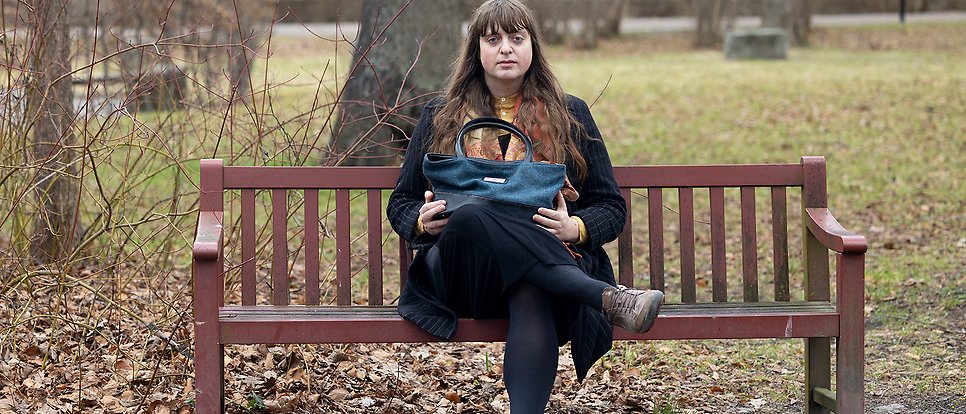Insurance and social skills for security on business trips

Dolores Fors lost her handbag during a business trip in the United States. Photo: Mikael Wallerstedt
Had an accident or been robbed while travelling on business? Not to worry. As a university employee you’re covered.
All university employees, including doctoral students holding a doctoral studentship (but not other students!), are insured when travelling on university business. You are entitled to compensation in the event of accident, damage, theft, etc.
Doctoral student Dolores Fors at the Department of English benefited from this silver lining. During a business trip in the United States, her handbag was stolen just before she was due to fly home.
What happened?
“I was at a three-day conference in Boston in October 2023 to give a presentation,” Fors recalls. “It was all very prestigious, my supervisor was there and I was very nervous.”
The presentation went well, but when Fors was about to disembark from the packed bus to the airport to fly home, she discovered that her handbag had been stolen.
Does that mean you lost your passport, tickets and money?
“Luckily, I had the ticket in my mobile phone and my bank card was also in the phone case, but I lost my passport, my wallet with my ID card and my house keys,” Fors says.
No passport, no flight or hotel
The discovery was followed by several hours of frantic searching on buses and at lost property offices. Fors met many sympathetic bus drivers, but that was no help. Her handbag was gone. At the airport, Fors talked with her airline and they helped her rebook her ticket.
“But the problem was, I couldn’t fly without my passport,” she says. “I needed to arrange a new emergency passport via the consulate. And it was closed for several days.”
Fors had to spend the night at the airport, as no hotel would accept her without a passport. It was an unsettling experience which made her feel extremely vulnerable.
In the morning, Fors received help via the conference organisers and another doctoral student. She travelled back to campus and was given a place to sleep on an airbed in a shared student room.
Home via Madrid on an emergency passport
The stay in Boston, which should have lasted three days, ended up being nine days long. The consulate provided an emergency passport. Fors withdrew money and paid cash, as the consulate demanded.
“I made a lot of phone calls, to the Swedish Ministry for Foreign Affairs and the Swedish Police, for example, but thankfully the insurance covered this as well as the cost of the new passport.”
Early on Friday morning, Fors was finally set to travel home to Sweden. Unfortunately, her problems continued to the very end: the flight she had been rebooked on was cancelled and the emergency passport – essentially a sheet of paper – was really only valid for the flight that was specified. However, she got home, via Madrid.
What do you do to get help?
“The University’s travel coordinator Marie Engegard was incredibly reassuring and helped with the insurance claims afterwards,” Fors says. “She showed me what compensation I was entitled to, how much, and so on.”
Dare to ask for help and be aware
The insurance covered a new lock that Fors had to order at home. It also covered cash to pay for the emergency passport and other expenses, as well as a new passport, ID card, possessions and jewellery that were in the bag, and so on. It may also be possible to receive a per diem allowance via the insurance company, though that did not apply in Dors’s case.
It took a long time to fill in the forms and she had to attach receipts and police reports. However, even though she sent in the application around the time of the major winter holidays, the compensation arrived in just three weeks.
“Marie Engegard got back to me really quickly, she was a rock, and we were in close contact throughout and afterwards,” Fors says.
Do you have any advice for other members of staff who are due to travel on university business?
“It’s essential to have good social skills, a fundamental sense of security as a person and dare to ask for help,” Fors says. “Check your insurance!”
Ulrika Hurtig
